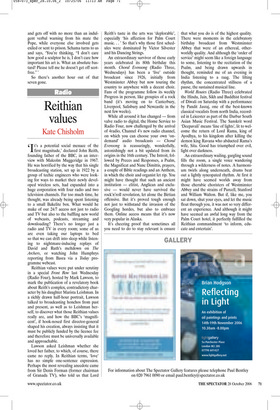Reithian values
Kate Chisholm
‘It’s a potential social menace of the first magnitude,’ declared John Reith, founding father of the BBC, in an interview with Malcolm Muggeridge in 1967. He was horrified by the way that his single broadcasting station, set up in 1922 by a group of techie engineers who were looking for ways to market their newly developed wireless sets, had expanded into a huge corporation with four radio and two television channels. Far too much time, he thought, was already being spent listening to a small Bakelite box. What would he make of our 24/7 access not just to radio and TV but also to the baffling new world of webcasts, podcasts, streaming and downloading? There’s no longer just a radio and TV in every room; some of us are even taking our laptops to bed so that we can drift into sleep while listening to nightmare-inducing replays of David and Ruth’s meltdown on The Archers, or watching John Humphrys reporting from Basra via a Today programme webcast.
Reithian values were put under scrutiny in a special Front Row last Wednesday (Radio Four), hosted by Mark Lawson, to mark the publication of a revelatory book about Reith’s complex, contradictory character by his daughter Marista Leishman. In a richly drawn half-hour portrait, Lawson talked to broadcasting honchos from past and present, as well as to Leishman herself, to discover what those Reithian values really are, and how the BBC’s ‘magnificent’, if hook-nosed first director-general shaped his creation, always insisting that it must be publicly funded by the licence fee and therefore must be universally available and approachable.
Lawson asked Leishman whether she loved her father, to which, of course, there came no reply. In Reithian terms, ‘love’ has no simple one-sentence expression. Perhaps the most revealing anecdote came from Sir Denis Forman (former chairman of Granada TV), who told us that Lord Reith’s taste in the arts was ‘deplorable’, especially ‘his affection for Palm Court music... ’ So that’s why those first schedules were dominated by Victor Silvester and his Dancing Strings.
An extraordinary survivor of those early years celebrated its 80th birthday this month. Choral Evensong (Radio Three, Wednesdays) has been a ‘live’ outside broadcast since 1926, initially from Westminster Abbey but now touring the country to anywhere with a decent choir. Fans of the programme follow its weekly Progress in person, like groupies of a rock band (it’s moving on to Canterbury, Liverpool, Salisbury and Newcastle in the next few weeks).
While all around it has changed — from valve radio to digital, the Home Service to Radio Four, now challenged by the arrival of 4radio, Channel 4’s new radio channel, on which you can choose your own ‘ondemand’ audio broadcasts — Choral Evensong is reassuringly, wonderfully, astonishingly not a bit updated from its origins in the 16th century. The Introit, followed by Preces and Responses, a Psalm, the Magnificat and Nunc Dimittis, prayers, a couple of Bible readings and an Anthem, in which the choir and organist let rip. You might have thought that such an ancient institution — elitist, Anglican and exclusive — would never have survived the rock’n’roll revolution, let alone the Birtian offensive. But it’s proved tough enough not just to withstand the invasion of the Googling hordes, but also to embrace them. Online access means that it’s now very popular in Alaska.
It’s cheering proof that sometimes all you need to do to stay relevant is ensure that what you do is of the highest quality. There were moments in the celebratory birthday broadcast from Westminster Abbey that were of an ethereal, otherworldly quality. And although the ‘order of service’ might seem like a foreign language to some, listening to the recitation of the Psalm, and being drawn upwards in thought, reminded me of an evening in India listening to a raag. The lilting rhythm, the concentrated stillness of a pause, the sustained musical line.
World Routes (Radio Three) celebrated the Hindu, Jain, Sikh and Buddhist festival of Diwali on Saturday with a performance by Pandit Jasraj, one of the best-known classical vocalists from north India, recorded in Leicester as part of the Darbar South Asian Music Festival. The Sanskrit word ‘Deepavali’ means ‘line of lights’, lit to welcome the return of Lord Rama, king of Ayodhya, to his kingdom after killing the demon king Ravana who abducted Rama’s wife, Sita. Good has triumphed over evil, light over darkness.
An extraordinary wailing, gargling sound fills the room, a single voice wandering through a wilderness of notes. A harmonium twirls along underneath, drums beat out a lightly syncopated rhythm. At first it might have seemed worlds away from those cherubic choristers of Westminster Abbey and the strains of Purcell, Stanford and William Walton. But if, like me, you sat down, shut your eyes, and let the music float through you, it was not so very different an experience. And although it might have seemed an awful long way from the Palm Court hotel, it perfectly fulfilled the Reithian commandment ‘to inform, educate and entertain’.


























































































 Previous page
Previous page